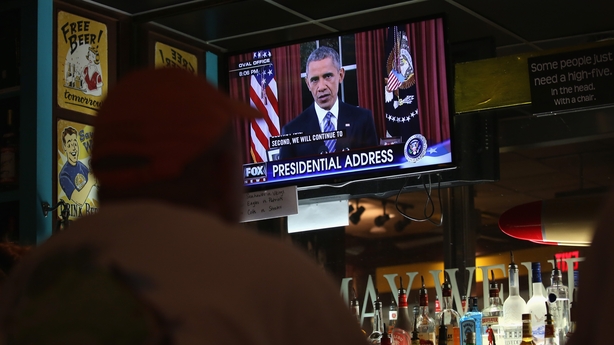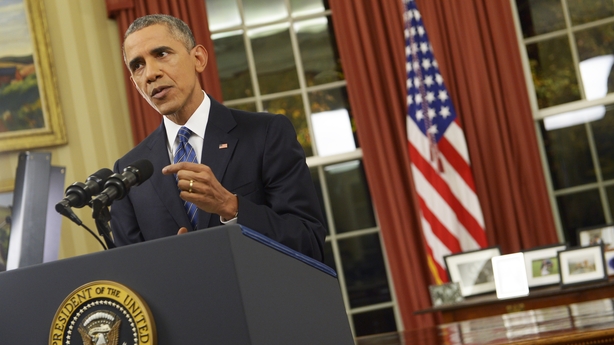US Republican presidential candidate Donald Trump said a "total and complete shutdown" of all Muslims entering the United States should be put into place until Congress can act.
In a statement, Mr Trump said that polling shows a "hatred" by Muslims toward Americans that could result in more attacks.
"Without looking at the various polling data, it is obvious to anybody the hatred is beyond comprehension," he said.
"Where this hatred comes from and why we will have to determine.
Until we are able to determine and understand this problem and the dangerous threat it poses, our country cannot be the victims of horrendous attacks by people that believe only in jihad, and have no sense of reason or respect for human life."
Donald Trump calls for ban on Muslims entering United States. More: https://t.co/rHZOcbVldc https://t.co/GKYaEph3r6
— RTÉ News (@rtenews) December 8, 2015
In response, the White House said Mr Trump's call was "totally contrary" to US values.
"We have, in our Bill of Rights, respect for the freedom of religion," one of President Barack Obama's top foreign policy aides, Ben Rhodes, told CNN.
Mr Trump's statement follows the mass shooting in California last week, where one of the two people responsible is believed to have pledged allegiance to leader of the so-called Islamic State group.
The investigation into the shooting is now focusing closely on the contacts the shooters may have had with radical Islamists in the US, as opposed to overseas, a government source said.
The source also said the evidence so far suggested the radicalisation of Syed Rizwan Farook and his wife Tashfeen Malik started no earlier than 2014.
Obama defends strategy to defeat Islamic State
Earlier, Mr Obama laid out the most sweeping defence yet of his strategy to defeat Islamic State in a rare Oval Office address.
However, Mr Obama offered a shift on the United States policy to confront what he called a "new phase" in the terrorist threat after the California attack.
Mr Obama sought to calm a US public increasingly jittery about the fight against Islamist militancy that once appeared to be waged overseas.
His remarks failed to quiet Republican critics who have long accused him of underestimating the militants' strength and staying power.
Mr Obama used his 14-minute nationally televised appearance to draw a careful line about what he would and would not do.
He pledged, for example, to "hunt down terrorist plotters" anywhere they are.
However, he insisted the US "should not be drawn once more into a long and costly ground war in Iraq or Syria".
He was speaking just four days after US-born Farook, 28, and his Pakistani wife opened fire on a holiday party for civil servants in San Bernardino killing 14 people.
The pair were killed hours later in a shoot-out with police.
Mr Obama condemned the attack as "an act of terrorism designed to kill innocent people".


But he also said the San Bernardino attack showed that "the terrorist threat has evolved into a new phase" as IS used the internet to "poison the minds" of potential assailants.
Mr Obama also made a connection between national security and the need for gun control following the country's latest mass shooting.
The FBI is investigating the paramilitary-style attack in California as inspired by IS, which controls swathes of Syria and Iraq and has shown an expanded reach beyond its Middle East strongholds, including complicity in the recent attacks in Paris that killed 130 people.
But Mr Obama, whose restraint contrasted sharply with French President Francois Hollande's impassioned words after the Paris attacks, said there was no evidence the California assault was directed by a militant group overseas or part of a broader conspiracy at home.
Nevertheless, Mr Obama sought to show his administration was on top of the crisis, despite new questions raised about the country's defenses against homegrown extremism.
"The threat from terrorism is real but we will overcome it," the US president said.
Mr Obama's Republican critics, including the party's presidential candidates, quickly panned his speech, just the third he has delivered from the Oval Office since he took up residency there in January 2009.
During his speech, Mr Obama called on Silicon Valley to help address the threat of militant groups using social media and electronic communications to plan and promote violence, setting up renewed debate over personal privacy online.
He also seized the opportunity to make the case again for US gun control, something he has done to little avail because of stiff Republican resistance, following numerous shooting sprees during his presidency.

